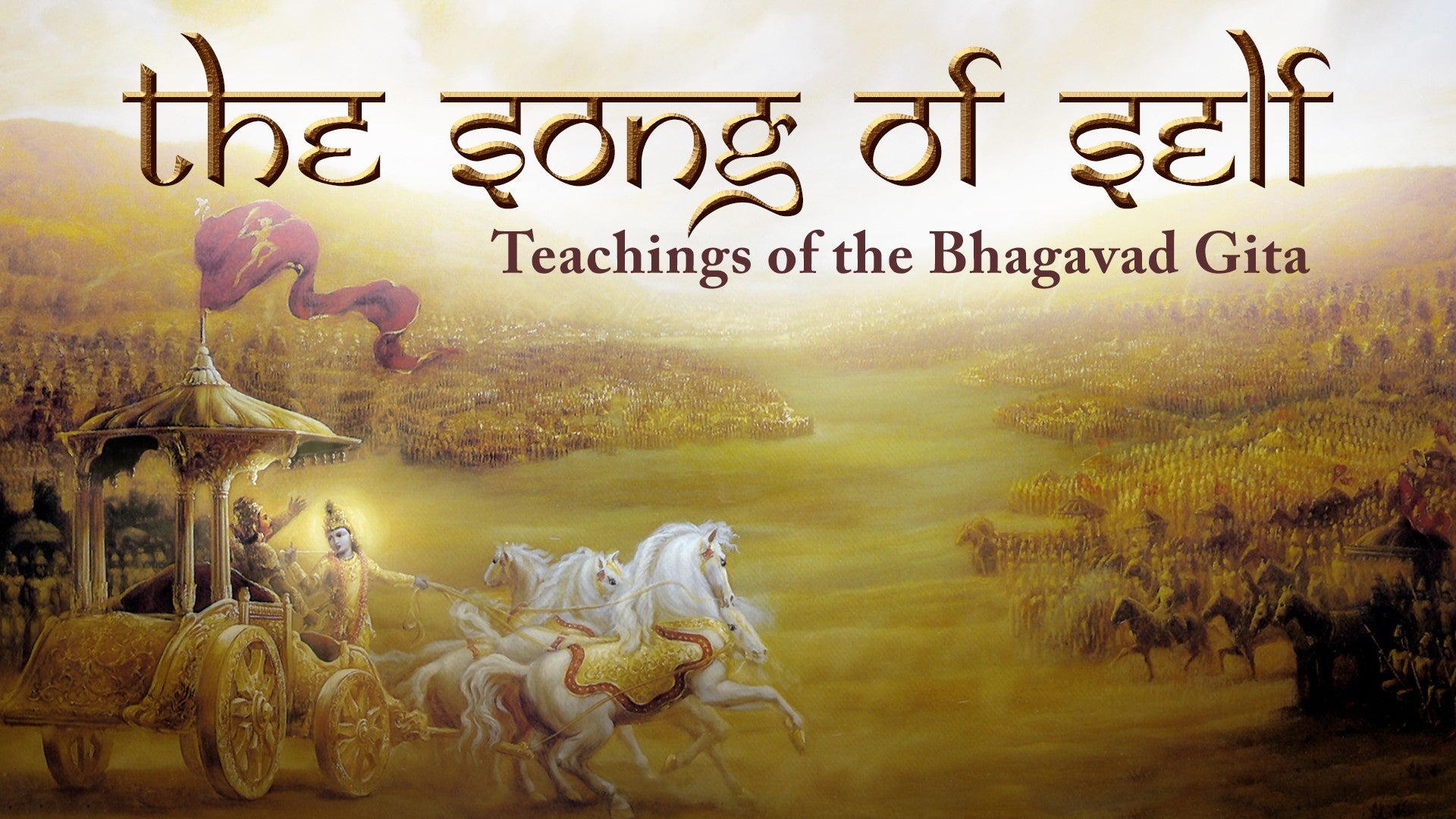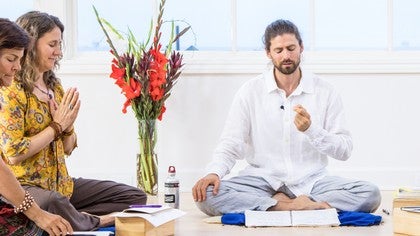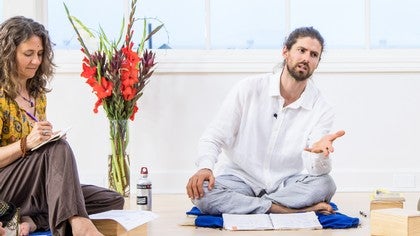Description
About This Video
Transcript
Read Full Transcript
So, having given us these two very beautiful and very practical definitions of yoga, yoga is samatva, evenness, and yoga is karmasukhaoshalam, it is skillfulness in the things that we do, it is efficiency. Krishna then starts to describe what we can kind of expect if we're able to act like that, if we're able to act in that balanced, skillful way. And he says in the 51st, karema jambuddhi yukta hai, palan chakta ma nishinha hai, janma banda vinyamukta, paranga chanjana ma yam. So here he says, basically, those who are ma nishinha, those who are wise, buddhi yukta hai, anuha, established in that wise, discerning way of action, palan chakta karema jamb, having thrown off, having left behind the attachment or the expectation to results born of action, then they go to this state, gachanti anamayam padam, they go to this pada, this state, which is anamayam, which means it's not painful, it is disease-less, it is not at all pernicious, it is very agreeable. And janma banda vinyamukta hai, they become free from the bondage of birth. So it's the idea that when we're born, we're bound to act. We can't avoid action, but Krishna is saying that if you learn to act very skillfully from that platform of a centered even foundation, then even though you can't avoid action, you can actually escape its binding influence. So here is kind of wrapping up, if you like, this section on what it means to act free from the binding influence of action, what it means to act wholly present, without being caught up in expectations of what might come. So you can be free to give all of your energy to the task at hand, then you get the optimal result, but you're also not so perturbed if it doesn't work out. Because it's the idea that the sincere action is its own reward. And so you can access, so it can sound that this verse is just describing some kind of exalted state of some great wise one who is able to act unperturbed whatever happens, but I think we can also experience it a more mundane level. If we're able to do something, we're doing it, and we're completely in that action, the action kind of becomes its own reward. And this is kind of like the secret, if you like, of karma yoga. The secret of the yoga of action is when you give yourself wholly to what you're doing, it becomes its own reward. For example, earlier we mentioned the blood orange, yes? So I'm gonna mention it again. Now, imagine that you go and visit somebody who has an orange tree, and let's say you grew up in a country that is not conducive to the cultivation of oranges, like me for example in England. And then you go and visit a place where oranges grow abundantly, and you taste one straight from the tree. Wow. And you taste it on the in the orchard of somebody who's been growing a particularly, and say variety that's particularly well adapted to that place. And then it says just come into season, it's absolutely perfectly ripe. Go pick one from this tree, it's just ready now. And then they peel it for you very carefully, and you taste it. And you know, this is gonna, this is the best orange you've ever tasted, because you've never really had the opportunity before. How will you be when you taste the orange? You really want to pay attention, you know? You're gonna be wholly connected to the opportunity to actually sense and experience what this orange tastes like, what's special about it. And then what type of experience you'd like you to have. Let's have a wonderful orange experience, yeah? You'll really taste it, you'll smell its fragrance, you'll relish the way that the taste explodes across the tongue. You will relish the texture and the juiceness of the orange. And it might well taste like the very best orange you ever had. But let's say you stay on the orange orchard for six months, and every day you eat three or four oranges. Will you eat the 300th orange as consciously with as much presence as that very first one? If you're an established Jorgen, yes. Because there's the idea that really every orange is unique. But let's say you grow up used to these oranges, and then you go and travel to England where all the oranges are imported. You might go to the market and you buy an imported orange and you get home. This is barely an orange. If you have the attitude, will you be able to discover or uncover or experience the particular beauty and the particular glory of this orange, which even though it may have traveled across the sea from the Mediterranean up to England, still has so much beautiful flavor within it. So sometimes it's the idea that if we have particular expectations, it stops us actually experiencing fully. However, if we allow ourselves to be fully in the here and now, then even things that we've experienced many times before can be immensely rewarding. So in life, for most of us, there are certain mundane tasks that we cannot help but avoid. So in the place that I stay in India, for example, I have a quite spacious room, but it's a rather dusty environment. So the room takes a lot of cleaning. And the first year I stayed there, this was a bit of a bind. You know, I've cleaned the floor again. It gets dusty so quickly. How does it get so dusty so quickly? And sometimes I would clean the floor. Here we go, cleaning the floor. We'll have this attitude, it was kind of a pain. And then I realized that this wasn't very sensible because I had to clean the floor. I like to have a clean floor. But then I realized, well, I can make the floor cleaning a practice. And as I press with the mop, I can actually appreciate the miraculous wondrous intelligence that allows me to know how much pressure I need to apply to scrub those little stains off the floor. And I turn around, I can turn around in a way paying attention to the miracle of intelligence that allows me to turn around on the floor. And then something that could be seen like drudgery, cleaning the floor, can become an enjoyable experience, can be an experience of yoga practice, of samadhi, of paying attention to the conscious power that is enabling and animating my experience. And this is the idea, whatever we do, if we give ourselves permission to actually do it wholly, then we can come to a state which feels very complete, which feels painless. Even if we don't get the outcome we might have hoped for, if we do it wholeheartedly, the action becomes its own reward. So it doesn't matter what it brings us, doing it in that way is its own satisfaction.
The Song of Self: Bhagavad Gita: Chapter 2
Comments

You need to be a subscriber to post a comment.
Please Log In or Create an Account to start your free trial.








